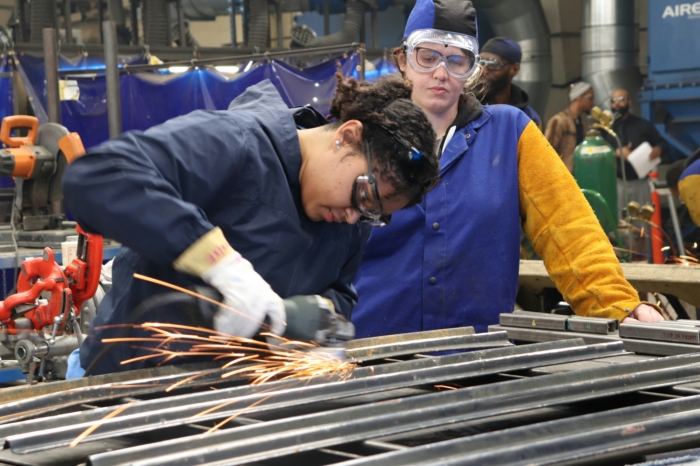Press Release: 5/16/2025
Pioneer Institute Releases Toolkit to Transform Boston’s Madison Park Technical Vocational High School
May 15, 2025
Lessons from Worcester, Springfield and successful regional voc-techs can be applied to Boston’s Madison Park
BOSTON – Pioneer Institute has released a new Urban Voc-Tech Toolkit aimed at helping Boston’s Madison Park Technical Vocational High School reach its full potential as a driver of opportunity for high-need students. Drawing on the successes of vocational-technical schools in Worcester, Springfield, and across Massachusetts, the toolkit outlines strategies based on high academic standards, strong industry partnerships, and increased school autonomy. The toolkit was coauthored by a group of five nationally recognized education leaders.
“Massachusetts vocational-technical schools successfully combine occupational education with high-quality academics, autonomy and partnerships with industry,” said David Ferreira, who co-authored the toolkit with Elana Feinberg. “We are hoping to provide a roadmap for applying a path forward for Boston.”
Why the Voc-Tech Model Works
Regional vocational-technical schools in Massachusetts alternate weekly between academics and specialized shop training, a structure that reinforces classroom learning through practical application. This model has produced some of the state’s highest graduation rates, long waitlists, and strong post-graduation outcomes. More than half of voc-tech graduates in Massachusetts attend four-year colleges.
Challenges Facing Madison Park
Despite the statewide success of this model, Madison Park has struggled to replicate it. While the school has made progress in enrollment and graduation rates since its 2016 turnaround plan, it still falls short on key academic indicators. MCAS scores remain below both Boston Public Schools (BPS) and state averages, and the school has met only half of the improvement goals set in the state’s 2020 BPS turnaround plan.
Chronic absenteeism is a major obstacle, with nearly 30 percent of students missing more than 20 percent of the school year. This severely limits participation in the school’s co-op program—an essential component of the voc-tech model that connects students with real-world, often paid, work experiences. Students must attend at least 90 percent of the time to be eligible for co-op.
“In Massachusetts, 95 percent of voc-tech schools have programs in which juniors and seniors alternate weekly between academic classes and co-op,” said co-author and former Worcester Tech Principal Sheila Harrity. “Students can be offered a paid job by the co-op partner in the summer after 11th grade and be paid during their 12th-grade co-op.”
“Worcester Tech and Springfield’s Putnam Tech have both managed successful turnarounds,” said Pioneer executive director Jim Stergios. “We want to catalyze the same kind of progress in Boston.”
Recommendations for Transforming Madison Park
The Urban Voc-Tech Toolkit draws on best practices from high-performing regional voc-tech schools and successful urban turnarounds, highlighting how Massachusetts’ vocational-technical schools integrate rigorous academics with hands-on occupational training, strong industry partnerships, and operational autonomy. Key recommendations for improving outcomes at Madison Park include:
- Balancing Academic and Vocational Training, ensuring a 50-50 split between academics and shop training, along with Advanced Placement and pre-AP courses, and early college or dual-enrollment opportunities.
- Strengthening Industry Partnerships, developing stronger relationships with local employers to provide co-op and job placement opportunities. While extra academic support for students to meet graduation requirements can sometimes take priority over co-op placements, building strong industry partnerships remains essential to the success of urban voc-tech schools.
- Reducing Chronic Absenteeism, implementing targeted interventions to improve attendance and increase co-op eligibility.
- Increasing School Autonomy, granting urban voc-tech schools greater independence by allowing them to operate as independent districts with their own superintendent and school committee. This structure, similar to that of regional voc-tech schools, provides the flexibility needed to implement proven strategies and adapt to changing industry needs.
- Investing in Facilities, recognizing the impact of modern, industry-standard facilities, as seen in the successful turnarounds at Worcester Tech and Putnam Tech. While a new home for Madison Park is currently in the design stage, it will be important to see that project come to fruition, as updated facilities have proven critical to similar turnarounds.
As a more general recommendation, the authors call for increased funding and expanded access to voc-tech education, especially in Boston and other urban areas.
Author and Co-Author Bios
Elana Feinberg is an education consultant with 25 years of experience in teaching, school leadership, and designing equitable, innovative school systems.
David J. Ferreira is a veteran vocational educator and former superintendent who led advocacy efforts for career and technical education across Massachusetts.
Warley Williams is Principal of GNBVT and a passionate leader dedicated to youth empowerment and student-centered education in Southcoast Massachusetts.
Dr. Sheila Harrity is a nationally recognized education leader and former superintendent known for transforming Worcester Tech into a U.S. Blue Ribbon School.
Kevin McCaskill is the principal of Brockton High School and former executive director of Madison Park Technical Vocational High School in Boston.
About Pioneer Institute
Pioneer empowers Americans with choices and opportunities to live freely and thrive. Working with state policymakers, we use expert research, educational initiatives, legal action and coalition-building to advance human potential in four critical areas: K-12 Education, Health, Economic Opportunity, and American Civic Values.
